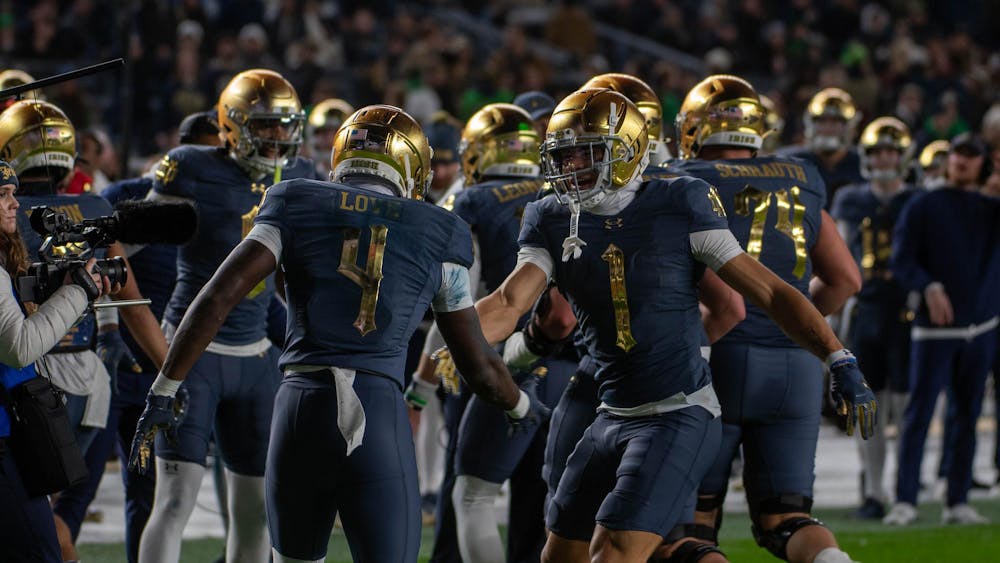
Cole prompted Kagan with questions about academia, constitutional interpretation, religion, ethics and writing during the roughly 65-minute chat in DeBartolo Performing Arts Center.
The associate justice’s visit was part of this year’s Notre Dame Forum, which focuses on "the future of democracy."
Kagan, the fourth woman to become a member of the court and, prior to that, Harvard Law School’s first female dean, said her career in academia and experience teaching affects the way she writes opinions.
“I try hard to figure out how it is that I’m going to explain things to people because law is complicated and law is often arcane. Especially when I started at the court and I was a junior justice, I got all these really super arcane, technical opinions to write. That’s the thing that junior justices tend to do [and] tend to get,” Kagan said. “But I wanted ordinary people to understand them.”
Kagan added that she didn’t want to dumb down opinions so that absolutely everybody could understand them at the expensive of legal precision.
“But I wanted to figure out a way to present ideas in a way that they were comprehensible to people because, in the end, this is a democracy and people in a democracy should be able to understand how our institutions of government work, including the courts,” she said.
Cole asked Kagan about a theory of constitutional interpretation called originalism. Kagan said the originalist position looks at what constitutional phrases meant at the time they were written, using the Equal Protection Clause of the 14th Amendment to describe the theory.
“In the late 1860s, we look at what people thought it meant to have equal protection of the laws or to have due process of law,” Kagan said. “Those set of applications, if you will, are the application that we should continue and nothing else [according to the originalist position].”
Kagan explained that one problem with originalism is that it will inevitably involve picking and choosing from the historical record.
“History is hard, and that kind of constitutional history — trying to figure out what words meant to people, what the words apply to and what the words didn’t — ... is a pretty impossible task,” Kagan said. “One person’s history has a historical argument saying ‘A,’ and another person has a historical argument saying not ‘A.’”
After talking through several Supreme Court decisions from the past few years concerning affirmative action, voting rights, the Biden administration’s student loan forgiveness plan and gerrymandering, Cole asked Kagan why only cases in which the justices are split down ideological lines receive most of the coverage in the press.
“To be completely honest, it has to be said that some of the more important cases do fall along pretty predictable lines,” Kagan said.
Kagan pointed out that many recent Supreme Court decisions have to do with national political issues.“You had the right to abortion overturned. You had a very important case about climate change and the ability of the government to combat climate change,” she said. “When all of these are falling 6-3, it doesn’t strike me as surprising that people would talk about that.”
In response to a question from Cole about role of faith in her life, Kagan, a practicing Jew, said she tries not to make being Jewish important to her as a judge.
“When you think about what religions are and what they do, they are systems of morality. They are codes of morality. Certainly, the Jewish religion is full of moral and ethical precepts,” Kagan said. “But those precepts of morality — just like any others — that’s personal morality. It would be improper for me to substitute my personal morality for the legal rules that I’m supposed to enforce [and] for the provisions of law that I'm supposed to interpret.”
Cole called Kagan one of the court's best writers and asked if she had any tips for young lawyers or law students about writing better.
“The first rule is edit, edit, edit … first drafts were meant to be succeeded by second drafts, which were meant to be succeeded by third drafts, and eventually things come into shape,” Kagan said. “So edit yourself [and] find good people to edit you. My clerks form a very important part of my writing process by editing my drafts.”








